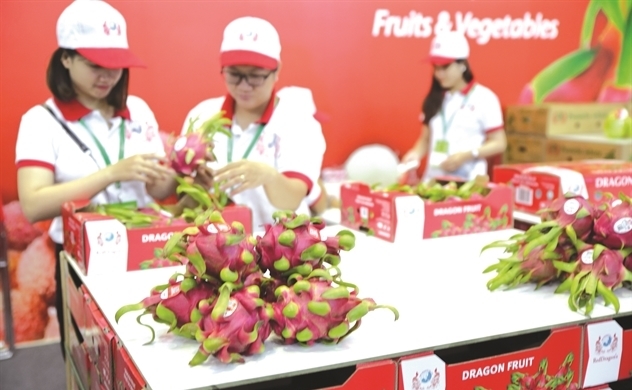Even with EVFTA, Vietnamese fruit still relies on Chinese market
ABO/VNA - Vietnamese fruit exporters have been trying to stop their reliance on China, but no progress has been made in finding new markets.
Rong Do on May 25 shipped its first consignment of litchis to Australia when the government began implementing a 3-step plan on loosening domestic travel restrictions.
Australia consumes 1,000 tons of litchis a year, according to Vietrade in Australia. However, Vietnam is more slow-paced than China and Thailand. Its high transportation cost makes litchis less competitive in the market.
Some analysts have shown concern about consumption of this year’s litchis though the harvest just began on May 20, as Chinese litchi output has increased significantly this year.
China, which consumes 45-60 percent of Vietnam’s litchis, now has 533,000 hectares of litchis and output of 2.55 million tons, an increase of 11.3 percent over 2019.
 |
Chinese farmers this year began harvesting litchis 15 days earlier than in previous years. The ban on cross-border exports could lead to a sharp fall in Vietnam’s litchi exports.
Bac Giang province estimates output of 160,000 tons, up by 10,000 tons over 2019. Hai Duong plans to harvest 45,000 tons this year.
Le Quoc Doanh, Deputy Minister of Agriculture and Rural Development, said that Covid-19 has made it more difficult to consume fruits, but hopes Vietnam will be able to export the first consignments of fresh litchis to Japan this year.
However, to date, the Japanese side has not signed a document on authorizing Vietnamese agencies to have technical supervision over litchi quality to be exported to the market. Japanese agencies have not accepted the 19 codes of growing areas (103 hectares in total) with the estimated output of 600 tons in the two districts of Yen The and Luc Ngan, as per the request of Bac Giang province and MARD.
Vietnamese farmers have begun harvesting new fruit crop amid a gloomy atmosphere though EVFTA is to take effect in some days.
In Yen Chau and Moc Chau, the largest mango growing areas of Son La, farmers are worried about consumption.
“We have no orders for this year,” said Quang Van Sy, director of Dong Tam Cooperative, a mango grower for export.
In 2019, the cooperative exported more than 40 tons of mango to Australia and France.
According to Sy, many farmers have had to sell mango in the domestic market at the low price of VND12,000 per kilogram. The mangos were sold at VND22,000 per kilogram to Europe last year.
According to Le Thanh Hoa from MARD, EVFTA offers opportunities to Vietnam to boost fruit exports, but it sets very strict requirements on traceability and food hygiene.
Kim Chi (Source: VNA)
 về đầu trang
về đầu trang







